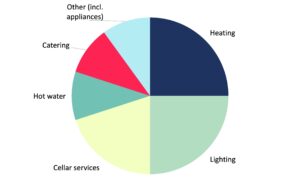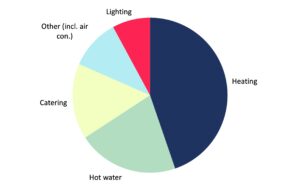Energy bills are rising, also in the hospitality sector. We’ll tell you how restaurants, hotels and pubs can save energy and in return, save costs: Both directly, by lowering the energy bill, and indirectly, by increasing guest comfort and by attracting new clientele due to your sustainable reputation.
This is volume three in our ‘Beat the bill’-series. Earlier, we wrote about the importance of understanding one’s energy bill, and about saving energy in the logistics real estate sector and in offices. In this article, we’ll help you save energy in hospitality.
The hospitality sector is all about energy: the positive energy guests experience when they go out for dinner. The energy they get from a relaxing weekend in a hotel. But also, the energy use in the kitchen, in heating guests’ water and cooling their room.
In restaurants, energy consumption per square meter is 2.5 times higher than in other commercial buildings. It’s the highest energy consuming activity per square meter. Lodging scores like the average commercial building. At the same time, hospitality is arguably the sector in which reducing energy use makes most (business) sense:
- You save money. Now more than ever.
- You develop a good reputation. Sustainable behavior is increasingly applauded and sought after by clients.
- Controlling energy use often increases comfort for guests and customers.
- You help fight environmental degradation.
- It feels good to do good.
With different stakeholders involved, there are different roles to take in decreasing energy consumption in hospitality. Therefore, we split actions between tenants or managers, and landlords or asset managers.
How tenants and managers can save energy
Energy accounts for approximately 6% of operating profits in the hospitality sector. Perhaps you feel that’s not a lot. Luckily the measures for energy reduction we are proposing are generally very low cost and effort, with quick paybacks.
Also, part of your payback does not directly show on your energy bill, but in higher profits due to increased customer loyalty.
Understand your energy bill
The hospitality sector is very diverse. It encompasses hotels, restaurants, cafés and other establishments of various types and sizes. To understand where and how you can save energy, you need to understand how you’re using it. hello energy provides software and displays that help you understand your energy use on a daily basis and communicate on it with asset managers and guests.
If you don’t have access to such tools, the charts below on the average energy consumption in hospitality may help. Note that no exact numbers are available, only a relative breakdown.


Figure 1: Hotels. Source: Carbon Trust. Figure 2: Pubs. Source: Carbon Trust.
Did you know surveys continuously show that guests prefer to choose hotels that minimize their impact on the environment, and are sometimes even prepared to pay extra for this?
Energy reduction tips
This is what you’re here for. Our energy saving advice:
- Keeping guests and customers comfortable is key for managers. But it’s possible to keep people comfortable and reduce heating costs. Recommended temperatures in hospitality are: around 21 °C in bars and lounges, max. 26 °C in bathrooms, between 18 °C and 21 °C in bedrooms at night, max. 24 °C in restaurants, 18 °C in corridors and around 17 °C in kitchens. Consider having a ‘dead band’: a range of temperatures between which both heating and cooling are off. For example between 19 and 24 for restaurants.
- Join the initiative Heat and Eat (if you’re in the Netherlands, or start your own initiative if you are abroad). You’re heating your space anyways, so why not have more people enjoy your warmth, so they can save energy at home. Guests are not obliged to order food and drink. And people who have a bit of money to spare can donate so that someone else can eat or drink.
- 52% of natural gas used in hotels is used for heating water. Having your boilers checked annually could save 5% yearly heating costs. Also insulate your boilers, pipes, tanks, and valves. It’s cheap and easy and pays back within months.
- Divide your establishment into different zones with different temperatures. For hotels: you can turn heating off at unoccupied floors if you house your guests on the same floor. Leaving the top floor unoccupied results in the highest savings.
Many establishments prefer to leave the front door open, as it attracts more guests. Use heavy, air-tight curtains around the door to keep in warm or cold air. - Educate guests on their energy use in a fun and non-patronizing way. Lead by example by showing them how you save energy without giving directives. For example, hang an infographic in the bathroom showing how much heating is saved by installing water saving shower heads. Or put a fun note on the window, asking the guest if they switched the air con off before opening the window.
- Switch staff and guest equipment completely off, such as staff computers at the end of the day, and guest televisions and coffee machines with every cleaning cycle. Avoid sleep or stand-by mode.
- The kitchen uses 34% of natural gas consumed in hotels. Training kitchen staff in energy management could reduce catering energy use by a third. There are endless ways kitchen staff can reduce energy use: from minimizing the number of times fridge doors are opened to optimizing pan-to-stove size, using dishwashers at full load, leaving food to cool off before placing it in the fridge, et cetera. Carbon Trust sums up dozens of such tips for staff.
How property owners or asset managers can save energy
While hotel managers and tenants can influence their behavior, you as a property owner or asset manager can impact (you guessed it) the property or asset. Here’s what you can do to reduce energy use.
Energy reduction tips
- Automate lighting and heating as much as possible. Invest in a compensator for example. It’s a modern type of heating control that adjusts inside temperatures to outside weather, learns how long it takes for a space to heat up and decides on optimal nighttime temperatures.
- Many hotel windows can’t open, to prevent guests from opening them with the air con or heating switched on. Consider having windows that do open, to make use of natural (and free) ventilation as much as possible. To prevent guests from wasting energy, automatically switch off heating and cooling when the window opens or consult with hotel managers to make guests aware of how to prevent energy wastage.
- This one sounds super obvious, but there are still many hotels that haven’t implemented it: choose energy efficient lighting and motion sensors. This could reduce lighting energy cost by 50%.
- Insulating a building well improves guest quality and saves costs. Typically, 22% of heating is lost through the roof, 26% through windows, 9% through walls and 8% through floors.
Inefficient lighting produces more residual heat than efficient lighting. So, choosing for efficient lighting can also save cooling costs.
Split incentives
To overcome split incentives – where the property owner makes investments but the tenant profits from the lower energy bills – it is wise to engage in a discussion with each other to find common motivators. You all want a better future; you all want to save energy.
To distribute costs and benefits more evenly, you could look into green leases, or you could share expenses and savings.
Engaging in energy management, for example with the insight hello energy provides into the establishment’s energy use, facilitates this cooperation.
Let’s beat the bill together!
